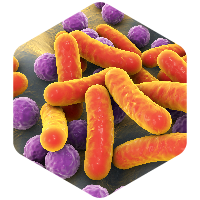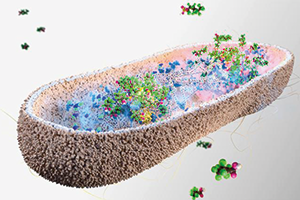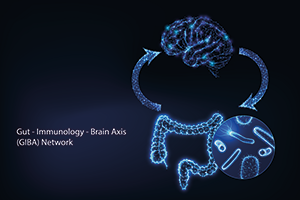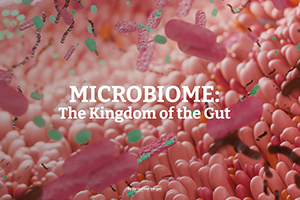The microbiome refers to the diverse community of microorganisms, including bacteria, viruses, and fungi, living within and on our bodies, as well as around us in the environment. Cambridge researchers from across disciplinary boundaries are working together to understand and harness the power of these tiny organisms. Unlocking the secrets of the microbiome offers immense promise for improving human, animal, and planetary health.
Collaboration and Engagement
Microbiome research is inherently interdisciplinary, spanning the fields of microbiology, genetics, immunology, ecology, bioinformatics and medicine, among others. Through a series of engagement meetings, Cambridge researchers are collaborating to explore how microbiomes influence health, disease and ecological balances in the wider environment.
Through a series of 'lab meeting' style events, researchers from 15 Departments and Institutes across Cambridge have collaborated to share their research findings, as well as the challenges facing the field more widely, allowing space to develop solutions and deliver new insights and innovations in the microbiome research space. The breadth of research excellence at Cambridge, coupled with our collaborative and multidisciplinary scientific ethos, positions us at the heart of an exciting and dynamic research field that holds significant promise for human and planetary health.
Recent Highlights
#Research
Gut microbes could protect us from toxic ‘forever chemicals’
Scientists have discovered that certain species of microbe found in the human gut can absorb PFAS - the toxic and long-lasting ‘forever chemicals.’ They say boosting these species in our gut microbiome could help protect us from the harmful effects of PFAS.
#Network
Cambridge partners on a new UK research network to unlock gut-immune-brain health links
A groundbreaking UK research network has been launched by UKRI to uncover how gut health influences the brain, immune system, and mental well-being – potentially leading to new treatments for conditions like anxiety, depression, and dementia.
#Profile
Microbiome: The Kingdom of the Gut
Scientists in the School are trying to get a grasp on the basic rules these bacteria play by, in the hope of understanding not only what’s going on in there, but how we might be able to use our microbiome to our advantage.
Read the article about the Microbiome
Academic Leads
Contributing Researchers
Alex Almeida, Veterinary Medicine
Rahul Arora, Veterinary Medicine and Yusuf Hamied Department of Chemistry
Kate Baker, Genetics
Tanmay Bharat, MRC Laboratory of Molecular Biology
Barbara Blacklaws, Veterinary Medicine
Josie Bryant, Wellcome Sanger Institute
David Bulmer, Pharmacology
Marta Camacho, Clinical Neurosciences
Cinzia Cantacessi, Veterinary Medicine
Priscilla Day-Walsh, Physiology, Development and Neuroscience and Obstetrics and Gynaecology
Paul Dupree, Biochemistry
Robert Finn, EMBL-EBI
Diana Fusco, Physics
Luis González, Veterinary Medicine and Wellcome Sanger Institute
Rui Guan, MRC Toxicology Unit
Ashray Gunjur, Wellcome Sanger Institute
Florian Hollfelder, Biochemistry
Mike Inouye, Public Health and Primary Care
Guy Jacobs, Archaeology
Trevor Lawley, Wellcome Sanger Institute
Valeria Lulla, Pathology
Archana Madhav, Medicine
Luis Miguel Martins, MRC Toxicology Unit
Reece McCoy, Chemical Engineering and Biotechnology
Stephen Moss, Medicine
Miles Parkes, Medicine
Seoyoung Park, MRC Mitochondrial Biology Unit
Julian Parkhill, Veterinary Medicine
Kiran Patil, MRC Toxicology Unit
Virginia Pedicord, Cambridge Institute of Therapeutic Immunology and Infectious Disease
Susannah Salter, Veterinary Medicine
Ana Catarina da Silva, Veterinary Medicine
Sarah Spencer, MRC Toxicology Unit
Lucy Weinert, Veterinary Medicine
Alexandra Wheeler-Enslin, Chemical Engineering and Biotechnology
Eske Willerslev, Zoology
Qi Yin, Veterinary Medicine
Yizhou Yu, MRC Toxicology Unit
Work with us
We welcome opportunities to collaborate with industry partners, policy makers and academics. If you are interested in working with us, please contact Dr Abi Herrmann, Research Strategy Manager.







